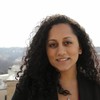Millions of people have been fleeing Syria since the bloody onset of the civil war in 2011—crossing borders on foot, boat and any vehicle available to save their families. For David Nott, however, that's just more reason to go to the devastated country as often as possible.
Nott is a London-based surgeon of Indian, Burmese and Welsh descent, who cut his teeth at the National Health Services, one of the best run health systems in the world. But he's spent the last decades dedicated to working under extreme conditions across the world in countries such as Haiti, Afghanistan, Bosnia and Pakistan. And he has offered medical support with organizations including Medicins San Frontieres (Doctors Without Borders), the International Committee of the Red Cross, and his own nonprofit, the David Nott Foundation.
Advertisement
"In a war, more senior doctors will tend to leave and only junior doctors [will] stay to help out because they haven't got any families," he told Motherboard over the phone from London.That leaves a huge deficit in health care for the people struggling to survive in cities such as Aleppo, one of the ISIS strongholds in Syria, where hospitals and clinics have collapsed and medicines are out of stock. Nott has been traveling to the city several times a year since 2013 to treat patients, and train junior doctors and health workers as they perform life-saving surgeries.
In late 2013, a Medicines Sans Frontiers group was kidnapped in Syria, and several international nonprofits started to withdraw their own aid workers. But Nott said a conversation with a Syrian doctor convinced him to keep coming back to help. "He had so much passion on helping his fellow Syrian people. I decided to devote all my time to the Syrian conflict. "When he visits Aleppo now, backed by funds from his own nonprofit and other private donors, Nott is very careful to only stay with and talk to the people he knows and trusts. He is usually driven around by vetted drivers or fellow doctors, usually without any headlights on, to stay under the radar. In the field, Nott goes from one operating room to the next whenever he is called, without much sleep or rest."In a war, more senior doctors will tend to leave and only junior doctors [will] stay to help out because they haven't got any families."
Advertisement
"It doesn't matter at the time—you feel completely different," he said. "If I had to do that in London, I wouldn't last a day. But to do that in a war zone, where it's so intense, you feel like a different person."Providing relief in Syria isn't safe: medical groups are often targeted in war zones, especially by terrorist groups like the Islamic State, and foreigners have been beheaded in recent years. Several hospitals have also been bombed or raided.Nott said it is impossible to work in a conflict zone like Syria without navigating the tricky web of international powers at play. He is critical of the West's role in the Syrian War, and has communicated his experiences to the British government. He is also part of a group called Doctors Under Fire, in which he is working to collect evidence about attacks on hospitals and doctors, some of which can happen through government strikes."When you see complete disregard for international humanitarian law, or hospitals being targeted, people being killed, you have to bang the drum," he said. "Many times the UN said it's a war crime, but nothing has happened to those people."While Nott is constantly grappling with the risks of his work, he is heartened by the amount of support he receives back at home. He said his wife, Eleanor Jupp, an analyst who now runs the David Nott Foundation, always encourages his trips to Syria, regardless of the risk. And his fans include the Queen of England, who awarded him with an Officer of the Most Excellent Order of the British Empire accolade.And the people that inspire Nott to keep going, even when he suffers from PTSD, are the ordinary people he encounters in his work, from the 4-year-old boy whose leg his team had saved in Syria, to the woman who sent him 32 knitted woolen caps for babies in the conflict zone."I will personally take those hats over when I go in February," he said. "These are things that people can do."
